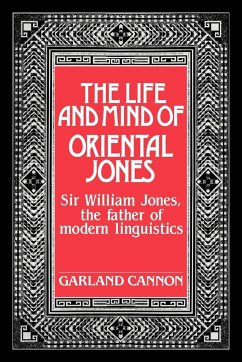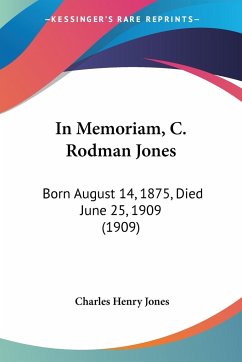This brilliant thesis of language families laid the groundwork for modern comparative linguistics.
Sir William Jones is best known for his famous Third Discourse of 1786 in which he proposed that Sanskrit's affinity to Greek and Latin could be explained by positing a common, earlier source, one known today as Indo-European. This brilliant thesis of language families laid the groundwork for modern comparative linguistics. Jones's interests and achievements, however, ranged far beyond language. He studied and made contributions to astronomy, botany, history, law, literature, music, physiology, politics, and religion. He served as a Supreme Court justice in India and founded the Asiatic Society, which stimulated worldwide interest in India and the Orient. He was friends with many of the leading intellectuals of his day and corresponded with Benjamin Franklin in America and with Burke, Gibbon, Johnson, Percy, and Reynolds in Britain. In his short life he mastered so many languages that even in his own time he was regarded as a phenomenon; and so he was. Garland Cannon, editor of The Letters of Sir William Jones, has written a new definitive biography of this fascinating man, who in his life and works teaches us that the path to understanding and appreciating the art and literature of a great culture very different from our own is through devoted study, a tolerant spirit, and an unquenchably curious mind.
Review quote:
"This is a delightful yet also definitive biography of a polyglot, a barrister, a legal mind, a philologist, and a linguist, labelled by Cannon (and everyone else, for that matter) as 'the father of modern linguistics'...well-written, entirely new...No one knows more about Jones than Cannon, who has displayed his breathtaking knowledge in full in this exciting story...Cannon's literary triumph is equally matched by Jones's linguistic achievements."
World
"This is a fine biography. Cannon has worked remarkably and not only on paper."
Anthony Burgess, London Observer
"...if Cannon is not George Trevelyan to Lord Macaulay, he is a valuable bibliographical guide to Jones' life and letters."
Benjamin E. Wallacker, Journal of Asian History
Table of contents:
Preface; Introduction; Chronology of Jones's life; 1. A barbanic oriental conqueror (to 1770); 2. Delicate Arab maidens and liquid ruby (1770-1772); 3. Persian Jones and constitutional law (1772-1777); 4. The athenian and eleutherion (1778-1780); 5. An ass laden with gold (1780); 6. Politics: writings and activism (1780-1782); 7. James River property (1782-1783); 8. A vision in the Indian Ocean (1783-1785); 9. A sacred oriental language (1785); 10. A genetic explanation: Indo-European (1786-1787); 11. Sanskrit literary treasures (1787-1788); 12. An Indian renaissance (1789); 13. A burning tropical sun (1790-1791); 14. Scholar-Martyr (1791-1794); 15. Jones today; Appendix; Notes; Selected bibliography; Index.
Hinweis: Dieser Artikel kann nur an eine deutsche Lieferadresse ausgeliefert werden.
Sir William Jones is best known for his famous Third Discourse of 1786 in which he proposed that Sanskrit's affinity to Greek and Latin could be explained by positing a common, earlier source, one known today as Indo-European. This brilliant thesis of language families laid the groundwork for modern comparative linguistics. Jones's interests and achievements, however, ranged far beyond language. He studied and made contributions to astronomy, botany, history, law, literature, music, physiology, politics, and religion. He served as a Supreme Court justice in India and founded the Asiatic Society, which stimulated worldwide interest in India and the Orient. He was friends with many of the leading intellectuals of his day and corresponded with Benjamin Franklin in America and with Burke, Gibbon, Johnson, Percy, and Reynolds in Britain. In his short life he mastered so many languages that even in his own time he was regarded as a phenomenon; and so he was. Garland Cannon, editor of The Letters of Sir William Jones, has written a new definitive biography of this fascinating man, who in his life and works teaches us that the path to understanding and appreciating the art and literature of a great culture very different from our own is through devoted study, a tolerant spirit, and an unquenchably curious mind.
Review quote:
"This is a delightful yet also definitive biography of a polyglot, a barrister, a legal mind, a philologist, and a linguist, labelled by Cannon (and everyone else, for that matter) as 'the father of modern linguistics'...well-written, entirely new...No one knows more about Jones than Cannon, who has displayed his breathtaking knowledge in full in this exciting story...Cannon's literary triumph is equally matched by Jones's linguistic achievements."
World
"This is a fine biography. Cannon has worked remarkably and not only on paper."
Anthony Burgess, London Observer
"...if Cannon is not George Trevelyan to Lord Macaulay, he is a valuable bibliographical guide to Jones' life and letters."
Benjamin E. Wallacker, Journal of Asian History
Table of contents:
Preface; Introduction; Chronology of Jones's life; 1. A barbanic oriental conqueror (to 1770); 2. Delicate Arab maidens and liquid ruby (1770-1772); 3. Persian Jones and constitutional law (1772-1777); 4. The athenian and eleutherion (1778-1780); 5. An ass laden with gold (1780); 6. Politics: writings and activism (1780-1782); 7. James River property (1782-1783); 8. A vision in the Indian Ocean (1783-1785); 9. A sacred oriental language (1785); 10. A genetic explanation: Indo-European (1786-1787); 11. Sanskrit literary treasures (1787-1788); 12. An Indian renaissance (1789); 13. A burning tropical sun (1790-1791); 14. Scholar-Martyr (1791-1794); 15. Jones today; Appendix; Notes; Selected bibliography; Index.
Hinweis: Dieser Artikel kann nur an eine deutsche Lieferadresse ausgeliefert werden.








